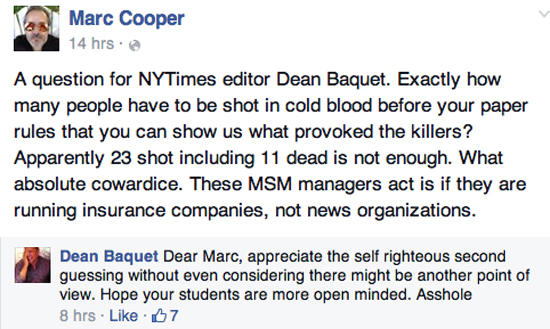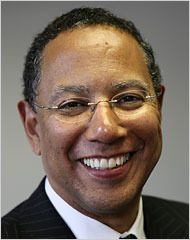New York Times Executive Editor Calls Critic An "Asshole"
New York Times executive editor Dean Baquet decided last week not to run images of the Charlie Hebdo cartoons so many people found to be offensive.
Marc Cooper, a journalist and associate professor at USC Annenberg’s School for Communication and Journalism, disagreed with Baquet’s decision and took to Facebook to register his complaint.
I’m not going to pretend that the word “asshole” is so shocking to our delicate sensibilities as to require an entire blog post. But I would like to make a few other points about this exchange.
First, Mr. Baquet was right that Mr. Cooper looked self-righteous. I suspect that was abundantly clear to many people, so Baquet didn’t need to be so heavy handed in his response to win this exchange. That’s especially true because he made a solid case for his decision not to publish.
According to Dylan Byers of Politico:
“Reached via email, Baquet told POLITICO: ‘Lots of people have disagreed with my decision. Some of them are in The Times. I get that. Mr Cooper’s comment was nasty and arrogant. So I told him what I thought.’
Baquet’s decision to forego running the cartoons that provoked terrorists to raid the offices of Charlie Hebdo, killing 12, have been heavily scrutinized. On Thursday, Baquet said he made his decision primarily because he did not want to insult the paper’s Muslim readers.
“’We have a standard that is pretty simple. We don’t run things that are designed to gratuitously offend,’ Baquet told POLITICO…[I] don’t expect all to agree. But let’s not forget the Muslim family in Brooklyn who read us and is offended by any depiction of what he sees as his prophet. I don’t give a damn about the head of ISIS but I do care about that family and it is arrogant to ignore them.’”
Why didn’t he simply say that in response to Mr. Cooper instead of lapsing into distracting name-calling?
Whenever a word like “asshole” is used by an executive, it’s almost certain to draw attention. That can be a mixed blessing. If it’s an issue the executive wants to become a big headline but is struggling to find any other way to make newsworthy, name-calling like this can actually be part of a strategic communications plan. I don’t suspect that was the case here.
Mr. Baquet also seemed to forget another cardinal rule: He should have treated his response as an opportunity to speak directly to other readers who shared Cooper’s position instead of treating it like a personal communication with Mr. Cooper.
Finally, I wonder what message this sends to his newsroom. On one hand, it’s easy to imagine that journalists who work for him deeply appreciate a boss who stands up for their editorial decisions. But on the other hand, I wonder if this gives license to reporters to engage with their critics in a similar manner, something I can’t imagine would be productive.
Baquet should expect criticism for these types of decisions. In my view, he should react to them by making his strongest case — which in this case, he had — and leave the swearing for his critics.
Don’t miss a thing! Click here to instantly join our mailing list and receive the best of the blog twice each month.





Proves you should never respond to criticism when you are angry. Baquet could have saved himself embarrassment simply by not using a curse word to indicate his disgust/anger. There was no need for it. It doesn’t show that he is standing up for his decision, instead, IMO, this shows a high level of defensiveness and probably ambivalence about his decision, and also some deep insecurity at being questioned. Sad.